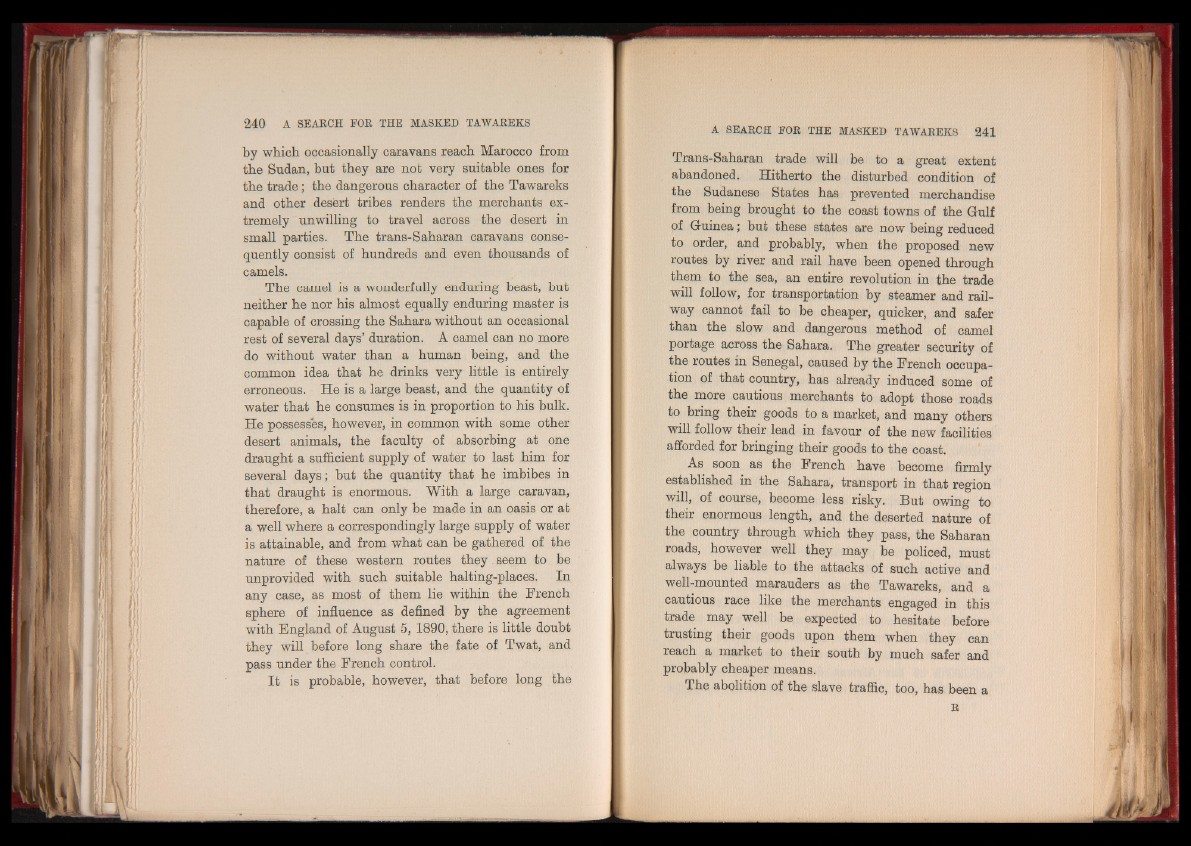
by which occasionally caravans reach Marocco from
the Sudan, but they are not very suitable ones for
the trade; the dangerous character of the Tawareks
and other desert tribes renders the merchants extremely
unwilling to travel across the desert in
small parties. The trans-Saharan caravans consequently
consist of hundreds and even thousands of
camels.
The camel is a wonderfully enduring beast, but
neither he nor his almost equally enduring master is
capable of crossing the Sahara without an occasional
rest of several days’ duration. A camel can no more
do without water than a human being, and the
common idea that he drinks very little is entirely
erroneous. He is a large beast, and the quantity of
water that he consumes is in proportion to his bulk.
He possesses, however, in common with some other
desert animals, the faculty of absorbing at one
draught a sufficient supply of water to last him for
several days; but the quantity that he imbibes in
that draught is enormous. With a large caravan,
therefore, a halt can only be made in an oasis or at
a well where a correspondingly large supply of water
is attainable, and from what can be gathered of the
nature of these western routes they. seem to be
unprovided with such suitable halting-places. In
any case, as most of them lie within the French
sphere of influence as defined by the agreement
with England of August 5, 1890, there is little doubt
they will before long share the fate of Twat, and
pass under the French control.
It is probable, however, that before long the
Trans-Saharan trade will be to a great extent
abandoned. Hitherto the disturbed condition of
the Sudanese States has prevented merchandise
from being brought to the coast towns of the Gulf
of Guinea; but these states are now being reduced
to order, and probably, when the proposed new
routes by river and rail have been opened through
them to the sea, an entire revolution in the trade
will follow, for transportation by steamer and railway
cannot fail to be cheaper, quicker, and safer
than the slow and dangerous method of camel
portage across the Sahara. The greater security of
the routes in Senegal, caused by the French occupation
of that country, has already induced some of
the more cautious merchants to adopt those roads
to bring their goods to a market, and many others
will follow their lead in favour of the new facilities
afforded for bringing their goods to the coast.
As soon as the French have become firmly
established in the Sahara, transport in that region
will, of course, become less risky. But owing to
their enormous length, and the deserted nature of
the country through which they pass, the Saharan
roads, however well they may be policed, must
always be liable to the attacks of such active and
well-mounted marauders as the Tawareks, and a
cautious race like the merchants engaged in this
trade may well be expected to hesitate before
trusting their goods upon them when they can
reach a market to their south by much safer and
probably cheaper means.
The abolition of the slave traffic, too, has been a